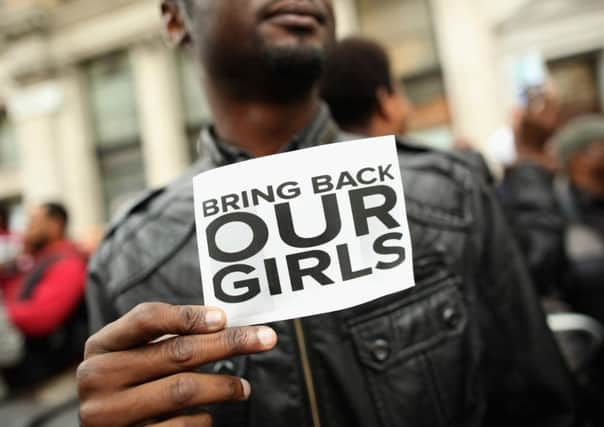Leaders: UK right to offer help in Nigeria


Their abduction by the Islamist militant group Boko Haram has appalled the world and brought international condemnation – the most compelling from the US First Lady Michelle Obama over the weekend.
Few, on hearing the growing crescendo of international condemnation, cannot help but feel that we cannot stand by and that something must be done. The brutal kidnapping is simple to condemn – but frustratingly complex when it comes to making an effective contribution to the rescue of the captured schoolgirls.
Advertisement
Hide AdAdvertisement
Hide AdSome suggestions have even included sending out British troops to help the Nigerian military. It is ironic that this should come as British troops prepare for the final withdrawal from Afghanistan and a troubled engagement there. This reinforced the view of many that the UK should be far more circumspect in future in foreign military engagements. Indeed, the legacies of Iraq and Afghanistan were the key reasons why the UK parliament blocked moves by the Prime Minister to help the rebels in Syria last year.
Demands that “something must be done” have to address the question of what exactly we can do in this horrific instance. The captured schoolgirls have been taken into little-known terrain with few roads or means of transport. The schoolchildren are now thought to be held in the Sambisa forest, a remote and inaccessible area of country. There have been reports that the girls have been taken out of the country, perhaps into Cameroon.
There is no recognised point of contact with Boko Haram, a loosely organised fanatical group whose leadership is difficult to identify and track down. What is known for sure is that the group condemns those who have been educated in the “Western” system, and is against the education of women. There are fears that the group’s leadership need camp followers and servants.
And the Nigerian government’s initial response has been painfully slow. The country, it seems, has grown inured to daily tales of horror from this area and developed a helpless fatalism about incidents of violence that recur with no clear solution.
Mr Cameron has offered the Nigerian president “anything that would be helpful” and has already sent out a team that includes some counter-terrorism and intelligence experts to work alongside the bigger American team. But it has encountered large information gaps. Detailed aerial scanning and observation may help to some extent. But it is local knowledge and intelligence that are paramount here.
Until more information becomes available, it is hard to see what more the British government can do in this situation, other than to be ready to provide help when specific and particular need has been identified.
Salmond still needs to apologise
FIRST Minister Alex Salmond’s offer to meet Ukrainians in Scotland after the row over his qualified praise for Russian president Vladimir Putin testifies to the difficulty he is having in shaking off this controversy.
It seems remarkable that for a politician whose skills are so widely acknowledged that this issue should have revealed a double fault line – both in origination and in the length of time it is taking to despatch the matter, the latter being one of the reasons why his offer has not been readily taken up.
Advertisement
Hide AdAdvertisement
Hide AdMr Salmond may be justified in claiming that his remarks were taken out of context and blown out of proportion. He is adamant that his remarks were reasonable when taken in context. However, that is a necessary but not sufficient insistence. The fact is, his remarks caused offence, and not just within the Ukrainian ex-pat community.
He has now repeated his insistence that his remarks were balanced. But if he genuinely seeks to resolve this issue, it would be helpful if he would acknowledge that, however justified he feels, offence was caused. And that offence was taken should rank equally in consideration when framing his response.
Of course he should take the opportunity of any further pronouncement to repeat his condemnation of the illegal annexation of the Crimea and Russia’s activities in the Ukraine. But how appropriate and how much more resonant this clarification would be were it to be accompanied by a graceful and sincere apology for any misunderstanding that has arisen over this issue.
Continuing to argue that he was entitled to say what he said will not put this matter to bed.